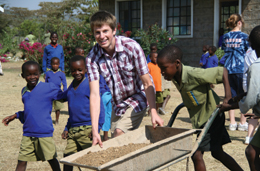Entitlement: It’s All About Shoes

By Bonnie Baker Cowan
After spending a week in Kenya with Free the Children, I think one of my most lasting impressions was the difference between Kenyan children and North American children in what they have and their attitudes to what they have.
At the schools in the Maasai Mara, children are often in bare feet. Families cannot afford shoes for all the children. They do have school uniforms: white shirts, blue, green or red sweaters depending on the school and short pants for boys, skirts for girls. Although their school uniforms are clean and neat, I noticed many had holes in the underarms of their sweaters. Some of them walk one or two hours to get to school every day, through a savannah that may have zebras or life-threatening lions or elephants. While elementary school is compulsory, high school requires tuition, an impossible dream for most kids, especially girls, who are often married off at the age of thirteen to become one of several wives to a man who may be old enough to be their father.
Free the Children has built more than 100 schools in Kenya providing education to more than 7,000 children every day, including a boarding school for secondary school girls. For all of these children, the opportunity to go to school, instead of hauling 20-litre jugs of water from a muddy river, fetching firewood, herding goats or caring for younger children, is a gift that makes their eyes shine with sheer joy and appreciation, and their dreams of breaking the chain of poverty a potential reality.
Fast forward to Canada a week later, where most of our grandkids are bused to school. No wonder we have a problem with obesity. They have closets clogged with different shoes for every sport, not to mention ‘indoor’ and ‘outdoor’ shoes for school. It doesn’t matter whether their clothes come from Old Navy or Abercrombie and Fitch; they have lots of clothes. They also have cell phones, iPods and iPads as soon as they’re old enough to punch in numbers or send a text. Many of our grandchildren feign tummy aches or any variety of illness to get out of going to school. They certainly do not have that bright-eyed enthusiasm I saw in Kenya.
When they get home from school, apart from having to do homework, our grandkids can play video or computer games, watch something on high definition television, play with friends or raid the fridge for snacks. “There’s nothing to eat,” is a familiar refrain. Check out Africa, kids! There often really is nothing to eat, unless you cook something over a wood fire and there is certainly no fridge full of snacks.
After seeing the work Free the Children is doing in Kenya, I feel hope and optimism for those children. With education, clean water, sanitation, health care and lessons in micro finance for the women, the children have a chance at a bright future, while developing their own incentives, using the valuable ideals of their culture and becoming self-sustaining, responsible citizens.
Not sure I have the same optimism for our grandchildren. It’s not their fault of course. The media charms them with the gadgets and electronics they should have. Busy parents give too much to assuage the guilt from being at work long hours. Teen grandkids boast about the coolest gadgets, Disney vacations and the most friends on Facebook.
Unfortunately, this sense of entitlement grandkids have diminishes their incentive, their creativity and any pride of ownership. Why should they? They made no sacrifices or effort to get the rows of hoodies or pretty dresses in their closet.
We’re not doing them any favors in the long run. The secret to stopping a sense of entitlement is to give kids a sense of ownership and responsibility for buying their own stuff. They need jobs around the house for which they get paid. Their earned money gives them the chance to own what they buy, appreciate the work they did to get their stuff and develop a sense of responsibility, maybe even resourcefulness.
Free the Children is working to rescue Kenyan children from poverty and with basics we take for granted, give them a chance to thrive, use their ingrained sense of resourcefulness and make sensible choices for a sustainable future. As grandparents, we need to rescue our grandchildren from another kind of poverty: entitlement — the kind of poverty that robs them of their real self worth and ingenuity.
To experience firsthand the work Free the Children is doing in Kenya, visit www.meritvacations.com or call toll-free 1-866-341-1777.